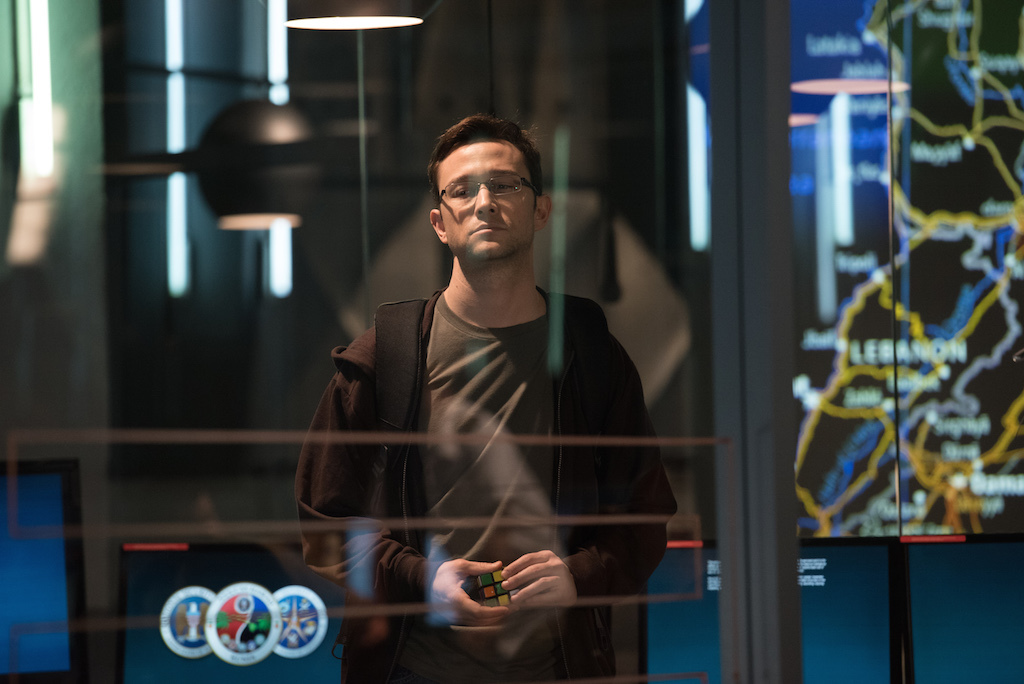
Edward Snowden is the perfect subject for an Oliver Stone film, and not just for the reasons you might think. Of course, his story involves one of Stone’s favorite subjects: government overreach, conspiracy, and cover-up. But it also deals with another theme that has pervaded the director’s work, in such films as Platoon and Born on the Fourth of July: loss of American idealism.
Turns out, computer genius Snowden (played with slow-burn intensity by Joseph Gordon Levitt) was a young Republican, who signed up for the army after 9/11. Brittle bones (and possibly epilepsy) cut his army career short, so he turned to the CIA, partly because he thought having top secret security clearance was “cool” but also because he believed, unquestioningly, in American exceptionalism.
His yoga-instructor girlfriend Lindsay (Shailene Woodley, bringing an appealing earthiness to her part) teases him about his beliefs and insists she’ll make a liberal out of him yet. He laughs at her.
Slowly, however, he discovers with horror that the American government is spying on its people—not just targeted folks on the terrorist watch list, but anyone, at any time. His supervisor at the CIA—a composite character named Corbin O’Brian, played with imposing paternalism by Rhys Ifans—chalks up Snowden’s outrage to youthful naiveté. The real grownups in the CIA know that sometimes you have to spy on American citizens to keep them safe, he explains. (His words are simply another iteration of the “you can’t handle the truth” speech from A Few Good Men.) But Snowden doesn’t learn to “get with the program.” In fact, as he moves from the CIA to the NSA and sees more of what his government is capable of (drone strikes, blackmail, video surveillance), the more horrified and paranoid he becomes. That’s when he decides to go public with what he knows.
If you’ve seen Laura Poitras’s excellent documentary Citizenfour, you’ll recognize the framing device used here. We see Snowden’s story in flashback, as he’s holed up in an upscale Hong Kong hotel with Poitras (Melissa Leo) and journalists Glenn Greenwald (Zachary Quinto) and Ewen MacAskill (Tom Wilkinson), waiting for The Guardian to greenlight his story and for his life to be changed forever.
Stone, who is now 70, doesn’t direct this one with his signature kaleidoscopic swagger. Instead, the film is taut and restrained. Its best, most heart-stopping scene shows how Snowden used his ever-present Rubik’s Cube to steal the intelligence. (Not sure if that’s really how it went down, but it was ingenious). The film also gives a revealing look at the culture inside the NSA, where young techies with bookbags and graphic tees are the secret (and perhaps unwitting) architects of the war on terror. The scenes with Lindsay effectively serve to humanize Edward, but Snowden could’ve used a little more Nicolas Cage as an eccentric CIA engineer who asked one too many questions and essentially got relegated to working alone in a storage closet. (A final cut to Cage’s character reacting with paternal pride to Snowden’s whistleblowing suggests that some of his part may have been left on the cutting room floor.)
It goes without saying that Stone is very much on Snowden’s side here (the real Snowden even makes a cameo appearance from Moscow at the end). But the film never quite feels like propaganda. It’s a grown-up thriller that convincingly makes the case that true patriots hold their government to a higher standard.
